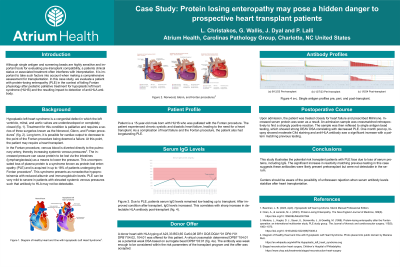(P215) Protein losing enteropathy may pose a hidden danger to prospective heart transplant patients
Location: Platinum Ballroom

Poster Presenter(s)
Body: A 15-year-old male patient with a history of hypoplastic left heart syndrome (HLHS) and protein losing enteropathy (PLE) in the context of failing Fontan physiology was evaluated for transplant. Pretransplant antibody screening performed using single antigen and mixed phenotype bead assays showed negative class I reactivity and very weak reactivity to DR4,7,9 and DPB DEAV epitope, though overall quantitative immunoglobulin levels were significantly decreased. A virtual crossmatch against a potential donor did show weak DSA to DPB1*104:01 but was felt to be within the risk parameters of the program. Flow crossmatch and antibody screening assays were performed post operatively to check for donor specific antibodies. The retrospective crossmatch did show positive B cell crossmatch with serum drawn at the time of transplant. The peri-transplant serum was tested using the single antigen bead assay and found to have a significantly increased DEAV pattern compared to the pretransplant screening which correlated with decreased PLE after inpatient heart failure management. One month post op, biopsy was performed showing moderate C4d staining. DSA testing showed a significant increase in all anti-HLA antibody with a pattern matching previous testing, suggesting that the antibody was present pretransplant but was not found at high enough levels to detect due to the PLE.
Conclusion: This case illustrates the potential risk transplant patients with PLE face due to loss of serum proteins, including IgG. The significant increase in reactivity matching previous testing in this case suggests these antibodies were likely present pretransplant but were not detectable in the serum. Centers should be aware of the possibility of unforeseen rejection when serum antibody levels stabilize after transplantation.
Conclusion: This case illustrates the potential risk transplant patients with PLE face due to loss of serum proteins, including IgG. The significant increase in reactivity matching previous testing in this case suggests these antibodies were likely present pretransplant but were not detectable in the serum. Centers should be aware of the possibility of unforeseen rejection when serum antibody levels stabilize after transplantation.

